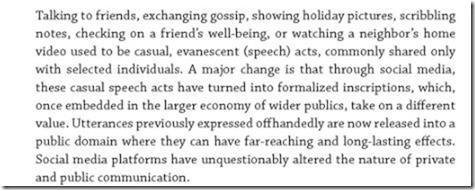Participating in an Online Community~Week 6 Post 1
Disclaimer: This post is part of course requirements following this assignment: Extend your identity in the direction of your career path and participate in a new online community. Interact online using your projected identity for at least six weeks. Think deeply about identity and learning and blog twice a week about your experience. Take time to analyze the meaning, power, and constraints of the community on your learning.
Week 6, Post 1
I have gravitated back to the Sci-Fi and Fantasy book group on Goodreads and away from the other group I joined. There was not enough engagement at the second group. Posts were mostly invitations to upcoming events. I like the robust dialogue in my Goodreads group. Perhaps I am experiencing the sense of communication described by José van Dijck in The culture of connectivity : a critical history of social media:
Sherry Turkle writes that “virtual places offer connection with uncertain claims to commitment” (page 153). I disagree. In my online group, I find a constancy of commitment, exploration, discussion, and communication. On average, the group generates over 400 posts per week. One post invites us to collectively read the book of the month collectively selected for December.
My online group chose The Long Earth as its December book choice. Its authors are Terry Pratchett and Stephen Baxter and it received the Goodreads’ Choice Award in the category Science Fiction in 2012.
The Long Earth plots involves multiple Earths– parallel worlds– which people traverse by a simple piece of hardware that can be manufactured from Radio Shack parts and a potato. It reminds me a little bit of The Hitchhiker’s Guide to the Galaxy. The main character, Joshua, realizes he does not need the interplanetary device to travel between the multiple planes. Joshua and a Tibetan motorcycle repairman now reincarnated as a super-computer periodically staying in a coke machine set off on a journey to exploration the parallel worlds.
From other reviews, Schrödinger’s cat, quantum physics and universal branching theory are intertwined with the British humor of Terry Pratchett and the scientific mind of Stephen Baxter.
I’ve been warned about the ending when one group member wrote, “A story without an ending is an elaborate typing exercise.” I decide to read ahead a bit and start the book a bit early.
But the writing is elegantly hypnotic:
“All of the Long Earth, Earths, untold Earths. More Earths than could be counted, some said. And all you had to do was walk sideways into them, one after the next, an unending chain.” The Long Earth, page 3.
The description of walking sideways, traversing multiple communities, multiple assignments and multiple expectations surely describes my experience during this first semester of doctoral work. Maybe that is why I am drawn to this story.
Sources:
Dijck, José van (2013). The Culture of Connectivity : A Critical History of Social Media. Oxford University Press. Link
Pratchett, T and Baxter, S. (2012). The Long Earth. Harper Collins. Link
Turkle, Sherry (2012). Alone Together: Why We Expect More from Technology and Less from Each Other. Basic Books; First Trade Paper Edition edition. Link




